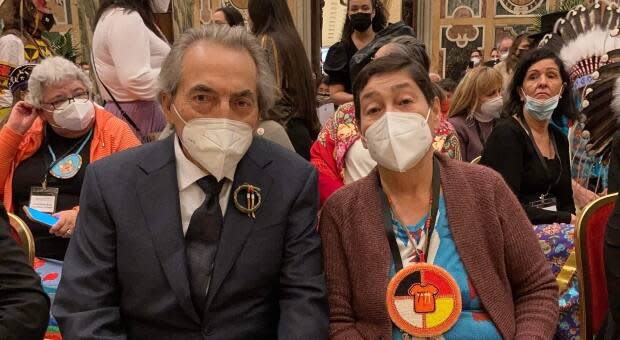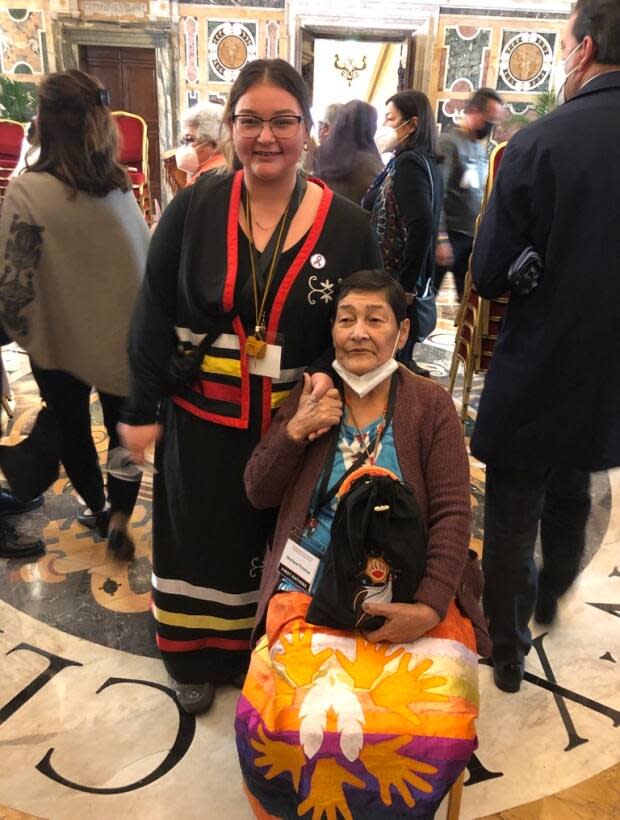Lennox Island elder 'elated' after travelling to Rome, hearing Pope's apology

Marlene Thomas had a front-row seat to hear Pope Francis make his historic apology to Canada's Indigenous people earlier this month, but her journey included a sudden and unexpected stay in hospital in Rome — and it nearly kept her away from the long-awaited event.
"I was elated," said Thomas, 67, at home again on Lennox Island First Nation this week. "I wouldn't have got any other opportunity. I figured that was my time, my only time that I could get to see him and be in the same room."
On April 1, Pope Francis met personally with a delegation of First Nations people, Métis and Inuit at the Vatican and said he's sorry for the decades of abuse and maltreatment of Indigenous people within Canada's notorious residential school system.
The Roman Catholic Church was one of the main Christian denominations that ran the schools on the behalf of the federal government, and the last to issue a formal apology like this.
Thomas shared the front row of the 52-minute papal audience with former national chief of the Assembly of First Nations, Phil Fontaine, among other elders. She wore traditional Mi'kmaq clothing for the occasion.
She believes she was asked to join the delegation to Rome because of her decades of advocacy on behalf of residential school survivors.

Thomas attended the Shubenacadie Indian Residential School in Nova Scotia from 1965 until its closing in 1967. Her mother, Mary Sapier, had also attended the school.
"In the beginning, when I first come home, I didn't want to talk about it, and nor did my mother," Thomas told CBC News this week. "Probably on my healing journey for about 30 years now…
"But I think now we can educate people. I think that's so important. Because that's part of what I've been doing. I've been going in the schools. I've been talking about it whenever I can."
'Can you get me out of here?'
An attack of pancreatitis nearly caused Thomas to miss the pope's apology, though. Two days before the event, she was admitted to hospital in Rome.
Granddaughter Mackenzie Thomas, 21, had come along as her support person.
"After Nana was in the hospital … I didn't get too much sleep," says the younger Thomas. She calmed down as her grandmother's condition stabilized, however.
"Friday came around, she messaged me and said, 'Can you get me out of here?' So that's my Nana. I'm going to pick her up obviously," said Thomas. "We made it just in time on the bus."

Younger people clustered at the back of the ornate chamber as the pope read from the English text of his prepared statement. Mackenzie Thomas says she found it hard to hear his voice.
"I just could not stop thinking about Nana … she got there," the young woman said. "She's front and centre. I was just so incredibly happy just to have her there and just to see and hear what she took from it."
Adoptive mother also met a pope
The elder Thomas says she was raised in the Roman Catholic church but rarely attends church services anymore. Her cultural and Catholic roots run deep, however. She says her adoptive mother met a previous pope, John Paul II, on his tour of Nova Scotia and Prince Edward Island in 1984.
"She got to dress up in her regalia and go meet him," said Thomas. "And so it was something that I wanted to do."
"I think for most of us, the Creator, the Lord, is one person. It's how we look at him."

The pancreatitis prevented Thomas from sharing her story personally with Pope Francis. The day before the apology, individual delegations of First Nations people, Métis and Inuit met privately with the pontiff to share their experiences. Thomas had intended to tell him of her mother's ordeal.
Hopes apology repeated in Canada
Marlene Thomas is pleased the Pope has said he intends to come to Canada. She hopes he visits the residential school in Kamloops, B.C., where the discovery of what appeared to be 215 unmarked graves sparked outrage around the world in 2021.
"I know he can't go to every school everywhere they found them, because that's a lot of schools and that's a lot of children," said Thomas.
"We were telling the truth. You know, we were telling our story. And now they have to listen… Now they can't bury it. To me, that's a rude awakening for them, you know, for the government, for the churches.
As for the April 1 apology, she said: "Yes, this time we went to him. But I want him to come to us. And I'm sure he's going to be sincere.
Delayed return to Canada
Marlene Thomas wore a mask throughout her audience with the Pope, and did not shake his hand. But her medical ordeal was not over. Later that day, she tested positive for COVID-19.
"It was definitely not a laughing matter," said Mackenzie Thomas, of her grandmother's hospitalizations.

The elder Thomas was placed in isolation in an Italian hospital and remained there after most of the Canadian delegation had flown home. Her granddaughter helped deal with doctors, language barriers, the Canadian embassy and travel arrangements. They finally boarded a plane and returned to Canada on April 12.
Mackenzie Thomas says the experience has confirmed her sense of pride, identity and connection to Indigenous culture.
"Just being in Rome with all these different Indigenous people all across Canada, it really has shown me that it's okay to be who I am," she said. "It's okay to practise my religion and wear my regalia and my hair ties… surrounded by all those strong Indigenous women and men."


